brand
KPMG SME REPORT: FIRSTBANK NAMED BIGGEST MOVER IN 2019

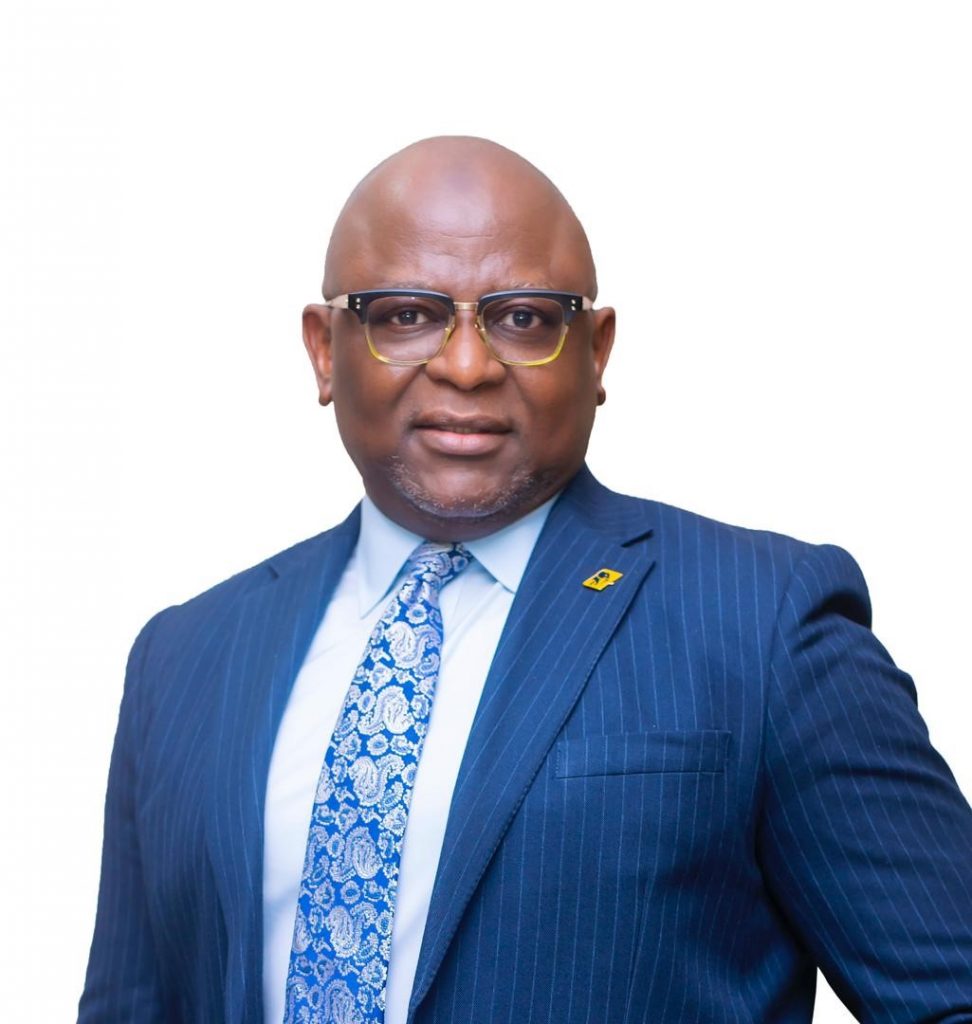
Written by Collins Nweze
Capital is crucial in driving sustainable Small and Medium Enterprises’(SMEs’) growth and uplifting the economy. First Bank of Nigeria Limited, as part of the launch of its specialised SMEs’ propositions, has continually supported SMEs through diverse initiatives. The bank says its support for SMEs is in line with the Central Bank of Nigeria’s directive on improved funding for SMEs to ensure economic growth and development. The economies of great nations thrive on the strength and performance of Small and Medium Enterprises (SMEs) seen as engine of growth. For Nigeria, the Central Bank (CBN) defines SMEs as enterprises with asset base (excluding land) of between N5 million and N500 million and labour force of 11 and 300 people. The benefits of funding SMEs have attracted many banks with eye on the future to invest and support SMEs in the interest of the economy. For SMEs to achieve these goals, operators’ easy access to credit must be promoted. First Bank of Nigeria Limited is one of the banks that is investing and supporting SMEs. Following research by the bank over the years, it identified these seven strategic pillars that are essential to the sustainability and growth of the SMEs. These include access to infrastructure, access to talent, capacity building, policy and regulation, access to resources, access to market as well as access to finance. The bank has also held its SMEs’ Week in Lagos, Abuja, Port Harcourt, Ibadan, Kano and Owerri. The week-long event was rounded off with a live webinar, facilitated by Gbenga Shobo, the bank’s Deputy Managing Director. According to Shobo, “FirstBank has, over the years, been at the forefront of supporting businesses, especially the SMEs, as we recognise that the SMEs are the engine of the economy. We are committed to ensuring that we leave no stone unturned as we connect with them in their continued contribution to national development in terms of the employment opportunities they create as well as their contribution to the nation’s GDP amongst many economic values. “The FirstBank SME Week is driven to promote the Bank’s SME proposition, thereby having SMEs across the country optimally enlightened on how to plug in. We believe this will help SMEs bolster their contribution to the growth and development of the economy.” The 2019 Nigeria banking industry customer experience survey report recently published by KPMG Nigeria showed that in the retail segment, the top two performers have remained the same for the fourth consecutive year. GTBank, Zenith Bank are top-rated bank in the 2019 ranking. Sterling Bank, FirstBank and UBA are the biggest movers in 2019, coming in third, fifth and seventh places
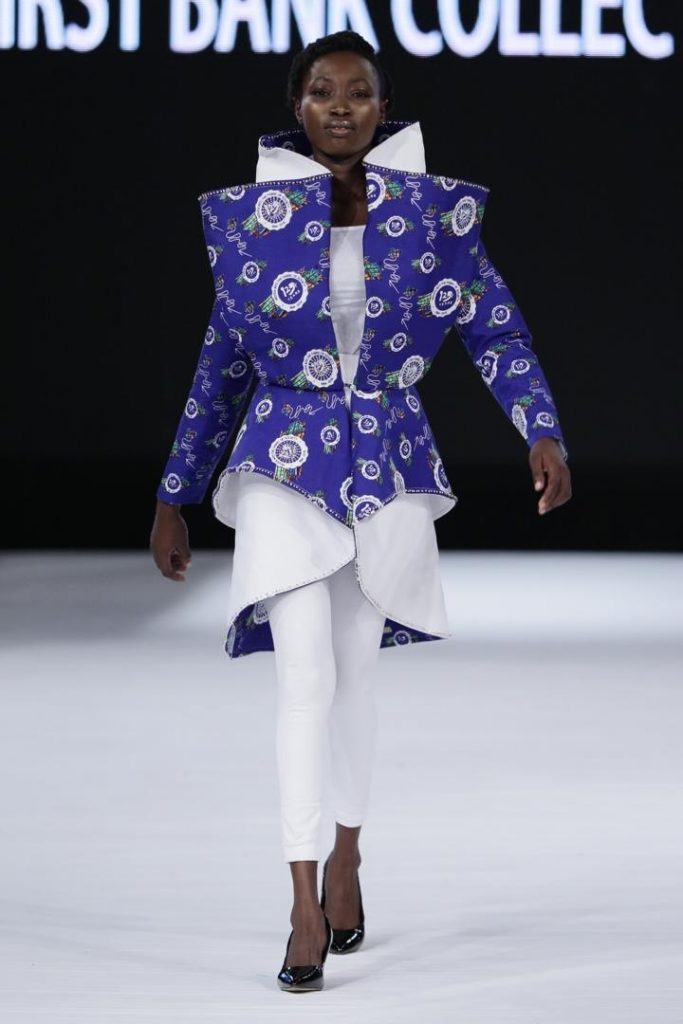
Commitment to fashion and entrepreneurship.
FirstBank sponsored the Sixth Africa Fashion Week, which held last December in Lagos. The event themed ‘’Africa Unites’’ was a convergence of fashion entrepreneurs and the public to promote the creativity and innovation of Nigerian and African brands through worldwide visibility, distribution and manufacturing. Dignitaries at the event include wives of the Ekiti, Ogun and Kwara state governors, Mrs Bisi Adeleye-Fayemi, Mrs Bamidele Abiodun and Mrs Folake Abdulrazaq. The Ooni of Ife, Oba Adeyeye Enitan Ogunwusi; former Director-General of Nigerian Tourism Development Corporation,Mrs Omotayo Omotosho; television presenter and model, Idia Aisen; model and beauty influencer, Whitney Madueke were also there. FirstBank was represented by Helen Ogboh, Business Manager, Corporate Banking. Speaking on FirstBank’s sponsorship of the event, the Bank’s Group Head, Marketing & Corporate Communications, Folake Ani-Mumuney, said: “We are pleased to identify with Africa Fashion Week Nigeria as it showcases creativity by African fashion designers to the teeming public, leading players and enthusiasts of African fashion while promoting their contribution to the growth of the fashion industry. “We will continue to drive advocacy for this as it can create jobs that will deepen opportunities for the revival of our textile industry resulting in SMEs’growth along the value chains especially, with the growing demand in the fashion industry.” Recently, the bank promoted the use of local fabrics with a ‘What If’ campaign to commemorate the country’s Independence. It ran across the social media channels, Twitter, Instagram and Facebook, focusing on the creativity of sewing local fabrics as a national symbol vis-a-vis our outfits, clothing accessories, household furniture, in line with the bank’s celebratory 125th Anniversary, themed, “Woven into the Fabric of Society”. Ani-Mumuney said the bank would continue to empower the society, including the support for small businesses and promotion of the growth of the entertainment industry. Also, on the list of fashion sponsorship credentials of the Bank is the Fashion Souk, as well as Street Souk organized in partnership with Eventful Limited. Ani-Mumuney said “Street Souk was designed to encourage the youth to channel their talents to genres as music, arts and fashion. It’s a platform that identifies opportunities, which promote the innovative spirit in youngsters. She noted that Street Souk was tied to the FirstBank’s initiative to empower the society, including small business owners. According to her, the initiative is also tied to the promotion of the entertainment industry. Manager XIIG Glover, a merchant at the Street Souk, Mr Obembe Abiola, said he was happy to be part of last year’s (2019) street trading. “We are here to showcase what we also have as a brand which is African made and to reach out to people to know about the brand. Last year (in 2018), we were also here and it was a great time out to meet up with new clients, customers and to meet up with other brands and this year is a lot more better than last year. We are large in number, new faces and everything is going on fine,” Abiola said. He commended FirstBank for organising the event aimed at encouraging entrepreneurship. Also, Creative Director, Dmf Designs & Shopwith5k, Adebayo Bankole, a participant, said she was glad to showcase her brand to people. “I have finally found my target audience here, people that are interested in street Souk culture in Nigeria. They are my target audience,” Bankole said. She stated that sales had been very amazing and that it was worth-while being part of this year’s Street Souk. “I really appreciate the fact that FirstBank is doing this because most banks go for ankara or made- in-Nigeria but this is promoting a different culture in Nigeria. Street trading is not common in Nigeria, the fact that FirstBank is able to support the promotion of street Souk in Nigeria is amazing,” Bankole added. The bank also said it would remain committed to the Federal Government’s diversification drive with the development of agricultural value chain to boost employment. FirstBank’s Chairman, Mrs Ibukun Awosika, stated this at last year’s edition of ‘Food Souk’, an event the Bank convened in partnership with Eventful Limited, an events management firm. Mrs Awosika said the bank would continue to support the agricultural value chain from production to consumption to create opportunities for SMEs in the food sector to create job opportunities. “As you have noticed, we have been doing a chain of Souks with Eventful. It is critical for the economy of the nation that we encourage the SMEs sector across different industries,” she said. According to her, the Food Souk was introduced to diversify the economy through agricultural development. “When we have 200 million people, food is big business because everybody will eat. So, what we are trying to do is in support of the nation’s building. We are seeking to encourage small, medium and big enterprises in different sectors of the economy. “One is to help create jobs because if we think that 65 per cent of our population is made up of people under 40 years and the highest unemployment rate is within the segment that is between 20 and 35, so you need to create jobs. “But you will only create jobs when you create entrepreneurs, as we create more businesses you are creating job opportunities,” Mrs Awosika said. She added that the bank’s focused on the growth of the economy with the hope it would benefit from it as a provider of financial services. “As we grow the economy, as we build lives of Nigerians, as we support the government’s investment in the diversification of the economy and help to create jobs through the enterprises we will ultimately benefit,” Mrs Awosika stated. The Chairman said FirstBank, the largest retail bank in the country, would continue to support growth and development of SMEs. “A lot of big businesses of today that grew in Nigeria are businesses we supported from scratch. “We are starting with different generations of new businesses and events like this help you to see the trends. It helps you to see the companies that need nurturin.
“It helps you to see the companies that you can support. It also gives you information about how you can best support them and engage them in their terrain to see businesses and understand their feelings to create the kind of product that will support their businesses,” Mrs Awosika said. A food vendor, Ms Ijeoma Ebeneme, the Chief Executive Officer, JEM N Iris, commended FirstBank for putting the event together. Ebeneme said she was at the fair to make profit, meet new clients as well as create the needed publicity for her brand. Food Souk, formerly known as Fiesta of Flavours, is a food and wine fair, that holds yearly at Harbour Point in Victoria Island, Lagos, since its premier edition in 2015. The fun food and beverage fair hosted by Eventful and sponsored by FirstBank provides an avenue for attendees to experience the entertainment, art and business of food. It showcases the best in local and international cuisine, cutting-edge food technology and cooking techniques, and the best beverages, wines and spirits the world offers. It provides management and training seminars, food demonstrations and performances.
brand
Body of Bank CEOs Delivers Critical Relief to Flood Victims in Niger State, Pledges Continued Support

 Pix 1 L-R: Registrar & Chief Executive of the Chartered Institute of Bankers of Nigeria (CIBN) Akin Morakinyo; Managing Director and Chief Executive Officer of Keystone Bank Limited, Mr. Hassan Imam; Group Managing Director/Chief Executive, Zenith Bank, Dame (Dr.) Adaora Umeoji; The Executive Governor of Niger State, His Excellency, Governor Mohammed Umaru Bago; Chairman, Body of Bank CEOs and Group Managing Director/CEO, United Bank for Africa (UBA) Plc, Oliver Alawuba; Managing Director Taj Bank Mr. Hamid Joda; and Secretary to the Government of Niger State (SSG), Alhaji Abubakar Usman during the donation of relief materials from the Body of Bank CEOs in Nigeria, aimed at supporting victims of the recent devastating floods in Mokwa Local Government Area held at the Niger State House in Abuja at the weekend.
Pix 1 L-R: Registrar & Chief Executive of the Chartered Institute of Bankers of Nigeria (CIBN) Akin Morakinyo; Managing Director and Chief Executive Officer of Keystone Bank Limited, Mr. Hassan Imam; Group Managing Director/Chief Executive, Zenith Bank, Dame (Dr.) Adaora Umeoji; The Executive Governor of Niger State, His Excellency, Governor Mohammed Umaru Bago; Chairman, Body of Bank CEOs and Group Managing Director/CEO, United Bank for Africa (UBA) Plc, Oliver Alawuba; Managing Director Taj Bank Mr. Hamid Joda; and Secretary to the Government of Niger State (SSG), Alhaji Abubakar Usman during the donation of relief materials from the Body of Bank CEOs in Nigeria, aimed at supporting victims of the recent devastating floods in Mokwa Local Government Area held at the Niger State House in Abuja at the weekend.
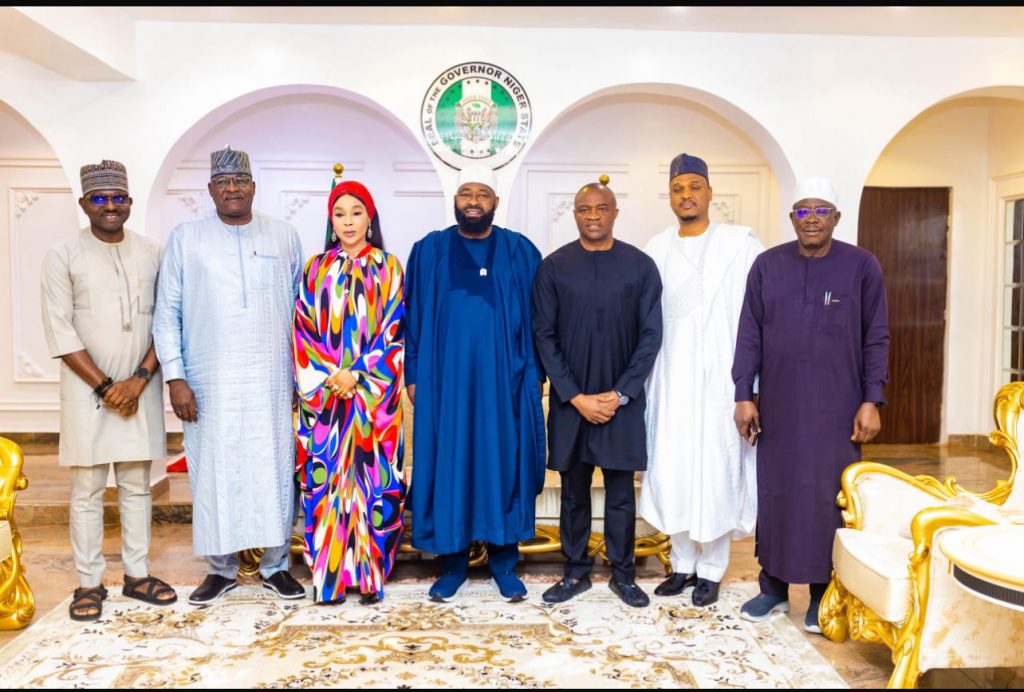 The Executive Governor of Niger State, His Excellency, Governor Mohammed Umaru Bago; Chairman, Body of Bank CEOs and Group Managing Director/CEO, United Bank for Africa (UBA) Plc, Oliver Alawuba during the donation of relief materials from the Body of Bank CEOs in Nigeria, aimed at supporting victims of the recent devastating floods in Mokwa Local Government Area held at the Niger State House in Abuja at the weekend
The Executive Governor of Niger State, His Excellency, Governor Mohammed Umaru Bago; Chairman, Body of Bank CEOs and Group Managing Director/CEO, United Bank for Africa (UBA) Plc, Oliver Alawuba during the donation of relief materials from the Body of Bank CEOs in Nigeria, aimed at supporting victims of the recent devastating floods in Mokwa Local Government Area held at the Niger State House in Abuja at the weekend
Pix 3: L-R: Managing Director and Chief Executive Officer of Keystone Bank Limited, Mr. Hassan Imam; Group Managing Director/Chief Executive, Zenith Bank, Dame (Dr.) Adaora Umeoji; The Executive Governor of Niger State, His Excellency, Governor Mohammed Umaru Bago; Chairman, Body of Bank CEOs and Group Managing Director/CEO, United Bank for Africa (UBA) Plc, Oliver Alawuba; and Managing Director Taj Bank Mr. Hamid Joda, during the donation of relief materials from the Body of Bank CEOs in Nigeria, aimed at supporting victims of the recent devastating floods in Mokwa Local Government Area held at the Niger State House in Abuja at the weekend.
In a heartwarming display of corporate social responsibility and solidarity, a consortium of Nigerian Bank CEOs, has pledged significant support to alleviate the suffering of flood victims in Niger State
The Executive Governor of Niger State, His Excellency, Governor Mohammed Umaru Bago on Saturday in Abuja received relief materials from the Body of Bank CEOs led by its Chairman, Mr Oliver Alawuba.
The gesture is aimed at supporting victims of the recent devastating floods in Mokwa Local Government Area of the state.
Oliver Alawuba who is also the Group Managing Director/CEO of United Bank for Africa(UBA), led the delegation to the Niger State Government house Abuja, where they presented essential relief items, including bags of rice, beverages, vegetable oil, and mattresses, valued at millions of naira.
The devastating floods, which have affected thousands of families in the region, have prompted the banking community to come together in a show of empathy and support to those displaced and affected by the disaster.
In his address, Alawuba expressed the banking industry’s deep sympathy for the affected communities and reaffirmed their dedication to sustainable support while pointing out that the gesture underscores the banking sector’s commitment to corporate social responsibility and humanitarian intervention especially in times of crisis.
He said, “Today, we stand with the people of Niger State in their time of need. We want you to know that we feel your pain and we give you our firm resolve to assist in rebuilding lives. This donation is just the beginning; we pledge continued collaboration with the Niger State Government to ensure long-term recovery and resilience.”
Other top CEOs and executives at the presentation included by the Group Managing Director/Chief Executive of Zenith Bank, Dame (Dr.) Adaora Umeoji, the Registrar and Chief Executive of the Chartered Institute of Bankers of Nigeria (CIBN), Mr. Akin Morakinyo, Managing Director and Chief Executive Officer of Keystone Bank Limited, Mr. Hassan Imam; Managing Director Taj Bank Mr. Hamid Joda; Secretary to the Government of Niger State (SSG), Alhaji Abubakar Usman senior government officials, banking executives, and media representatives, marking a significant step in public-private collaboration for humanitarian relief.
Governor Bago, who received the relief materials on behalf of the state, commending the banking sector for its timely intervention.
“This gesture reinforces the critical role of private-sector partnerships in disaster response,” Governor Bago stated. “We are grateful for this support and look forward to deeper collaboration in safeguarding our communities against future challenges. On behalf of the good people of Niger State, particularly the affected families in Mokwa, I extend our sincerest thanks for this timely and compassionate intervention,” Bago stated.
“The recent floods in the state brought immense hardship to the people, displacing families, destroying livelihoods, and disrupting communities and the banking sector, under the leadership of Alawuba and his esteemed colleagues, has demonstrated that beyond financial stewardship, they are true partners in national development and humanitarian service.
This donation is not just about the physical items; it is a symbol of hope, resilience, and the unwavering support of Nigeria’s financial institutions in times of need. It reassures our people that they are not forgotten, the governor stated.
…
brand
FirstBank Wins Gold for Best Corporate University in Social & Climate Change Impact

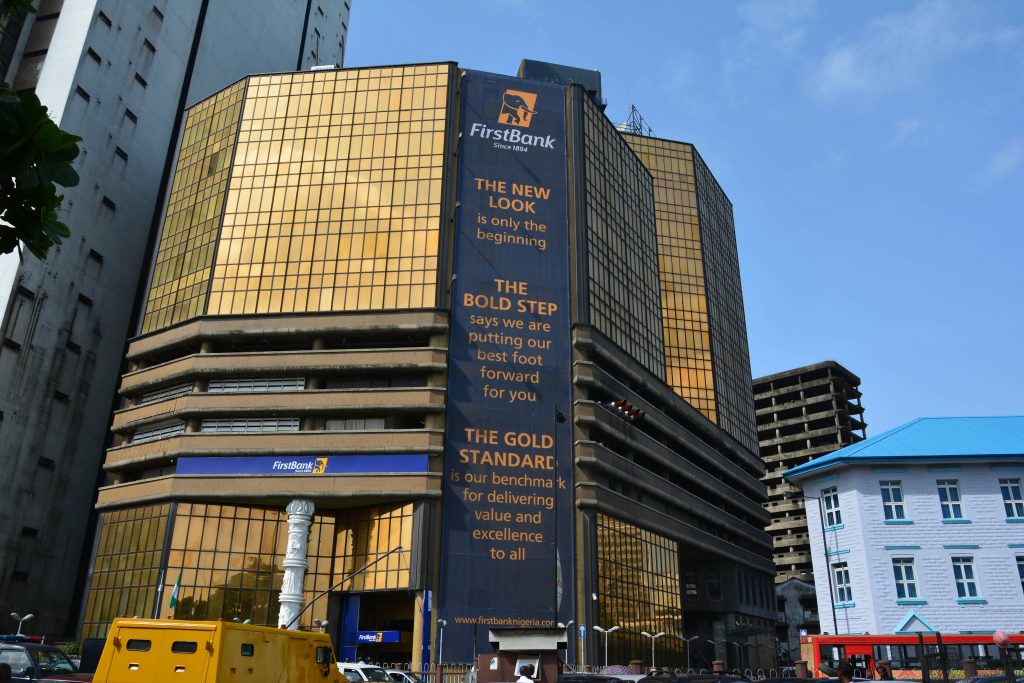 FirstBank, the West Africa premier bank and financial inclusion services provider, is thrilled to announce that its Corporate University, FirstAcademy, has been awarded the Gold Award for Best Corporate University in Social & Climate Change at the Global Council of Corporate Universities (GlobalCCU) Awards 2025.
FirstBank, the West Africa premier bank and financial inclusion services provider, is thrilled to announce that its Corporate University, FirstAcademy, has been awarded the Gold Award for Best Corporate University in Social & Climate Change at the Global Council of Corporate Universities (GlobalCCU) Awards 2025.
This highly acclaimed award recognises FirstAcademy’s outstanding commitment to driving social and climate change learning initiatives, aligning its learning and development programs with internal stakeholder needs, and promoting Corporate Social Responsibility (CSR).
The GlobalCCU Awards is a prestigious, biannual recognition of excellence in corporate universities, setting the highest standard for the industry. With a rich 12-year history dating back to its inaugural ceremony in Paris in 2013, the awards have consistently honoured outstanding Corporate Universities, learning and development structures worldwide. The GlobalCCU Awards celebrate institutions that create remarkable value for people, businesses, society and the planet.
FirstBank’s FirstAcademy exemplifies this mission by earning the Gold Award for Best Corporate University in Social & Climate Change at the 2025 ceremony in Paris, France. This distinction reflects FirstAcademy’s dedication to fostering sustainability and environmental responsibility; developing impactful learning initiatives that transcends traditional corporate training, with broader societal goals; integrating climate action into its portfolio and operations; expanding climate finance offerings and developing a climate action capacity building training program.
FirstAcademy was inaugurated in 2012 as the Bank’s designated corporate academy designed to provide structured talent development, knowledge management and culture change initiatives. One major objective of the academy is to equip staff with the requisite knowledge and skills required to deliver on the Bank’s strategic aspirations and to thrive in an ever-evolving work environment while contributing to social and environmental responsibility.
According to the Founder and Chairman of the GlobalCCU Awards, Annick Renaud-Coulon, “FirstAcademy is an outstanding Corporate University that is clearly the Best Corporate University globally for driving social and climate change learning initiatives.”
Congratulating FirstAcademy, the Founder and Chairman of the GlobalCCU Awards, Annick Renaud-Coulon, said “FirstAcademy is a very mature Corporate University which demonstrates a strong alignment with FirstBank’s vision of responsible banking and sustainable development, with clear support from senior leadership and a governance model that strategically connects learning to business priorities. Congratulations to FirstAcademy for setting a visionary standard in advancing meaningful social and climate change impact through learning and inclusive capacity building!”
In the words of Olayinka Ijabiyi, the Acting Group Head, Marketing and Corporate Communications, FirstBank “We are delighted to receive this international recognition for our efforts in promoting social responsibility and climate action. This award serves as a testament to our belief that businesses can be a force for good, driving transformation that extends beyond profit to create sustainable and equitable futures for all. FirstAcademy’s programs have not only enhanced employee skills but also contributed to the well-being of society and the environment.”
As FirstBank’s FirstAcademy continues to bridge the gap between corporate initiatives and community needs, it sets a leading example for corporate universities around the globe, inspiring others to follow suit in the quest for meaningful change.
brand
Access Holdings Topsin Asset Qualityin Proshare’s 2025Tier1 Banking Rankings
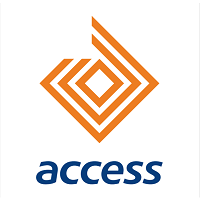

Access Holdings PLC has been ranked the Tier 1 bank
-
www.accessbankplc.comAccessHoldingsdemonstratedstrongfundamentalsacrossalltheseparameters.Itclosed Full Year 2024 with total assets of 41.5 trillion and a loan book of 13.1 trillion.₦ ₦The Group’scapitaladequacyratiostoodat20.46percent,whileassetgrowthfortheperiodreached55.49percent.Itscostofriskwasheldat1.25percent,netinterestmargin recorded at 6.80 percent, and earnings growth was an impressive 88.05 percent,all indicators of a business built on financial soundness and execution excellence.Speaking at the launch event, Olufemi Awoyemi, Chairman of Proshare, described thereport as a vital mirror into the shifting dynamics of Nigeria’s financial services industry.“AccessHoldingshasprovenitselfasastrong,adaptiveinstitution.Itsrobustcapitalbase, successful fundraising, and continental expansion efforts show a group that is notonlygrowingbutevolving.Asrecapitalisationreshapesthebankinglandscape,institutions like Access Holdings will continue to define the future of finance in Africa.”He further remarked on the nuance behind E
-

 news5 years ago
news5 years agoUPDATE: #ENDSARS: CCTV footage of Lekki shootings intact – Says Sanwo – Olu
-

 news2 years ago
news2 years agoEnvironmental Pollutions : OGONI COMMUNITY CRIES OUT, THREATENS TO SHUT DOWN FIRSTBANK,SHELL OIL COMPANY OPERATIONS FOR NOT PAYING COURT AWARD
-

 lifestyle5 years ago
lifestyle5 years agoFormer Miss World: Mixed reactions trail Agbani Darego’s looks
-

 health4 years ago
health4 years agoChairman Agege LG, Ganiyu Egunjobi Receives Covid-19 Vaccines
-

 politics2 months ago
politics2 months agoBreaking : Oborevwori , Okowa others dumps PDP, defects to APC
-

 lifestyle4 years ago
lifestyle4 years agoObateru: Celebrating a Quintessential PR Man at 60
-

 news1 month ago
news1 month agoBREAKING: Tinubu swears in new NNPCL Board
-

 health5 years ago
health5 years agoUPDATE : Nigeria Records 790 new cases of COVID-19


